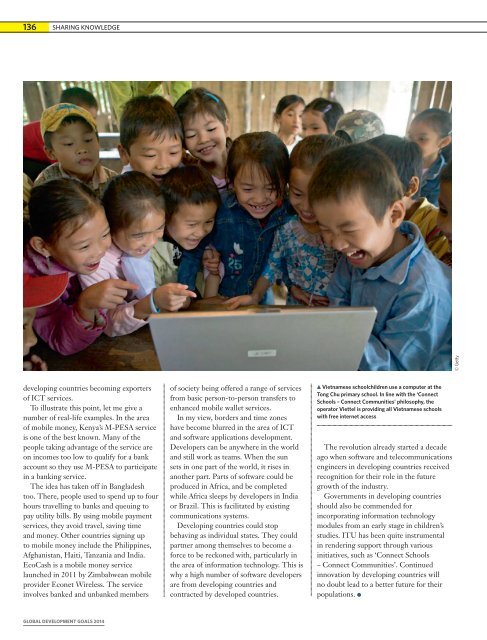FAMBB
FAMBB
FAMBB
You also want an ePaper? Increase the reach of your titles
YUMPU automatically turns print PDFs into web optimized ePapers that Google loves.
136 SHARING KNOWLEDGE© Gettydeveloping countries becoming exportersof ICT services.To illustrate this point, let me give anumber of real-life examples. In the areaof mobile money, Kenya’s M-PESA serviceis one of the best known. Many of thepeople taking advantage of the service areon incomes too low to qualify for a bankaccount so they use M-PESA to participatein a banking service.The idea has taken off in Bangladeshtoo. There, people used to spend up to fourhours travelling to banks and queuing topay utility bills. By using mobile paymentservices, they avoid travel, saving timeand money. Other countries signing upto mobile money include the Philippines,Afghanistan, Haiti, Tanzania and India.EcoCash is a mobile money servicelaunched in 2011 by Zimbabwean mobileprovider Econet Wireless. The serviceinvolves banked and unbanked membersof society being offered a range of servicesfrom basic person-to-person transfers toenhanced mobile wallet services.In my view, borders and time zoneshave become blurred in the area of ICTand software applications development.Developers can be anywhere in the worldand still work as teams. When the sunsets in one part of the world, it rises inanother part. Parts of software could beproduced in Africa, and be completedwhile Africa sleeps by developers in Indiaor Brazil. This is facilitated by existingcommunications systems.Developing countries could stopbehaving as individual states. They couldpartner among themselves to become aforce to be reckoned with, particularly inthe area of information technology. This iswhy a high number of software developersare from developing countries andcontracted by developed countries.Vietnamese schoolchildren use a computer at theTong Chu primary school. In line with the ‘ConnectSchools – Connect Communities’ philosophy, theoperator Viettel is providing all Vietnamese schoolswith free internet accessThe revolution already started a decadeago when software and telecommunicationsengineers in developing countries receivedrecognition for their role in the futuregrowth of the industry.Governments in developing countriesshould also be commended forincorporating information technologymodules from an early stage in children’sstudies. ITU has been quite instrumentalin rendering support through variousinitiatives, such as ‘Connect Schools– Connect Communities’. Continuedinnovation by developing countries willno doubt lead to a better future for theirpopulations.GLOBAL DEVELOPMENT GOALS 2014


